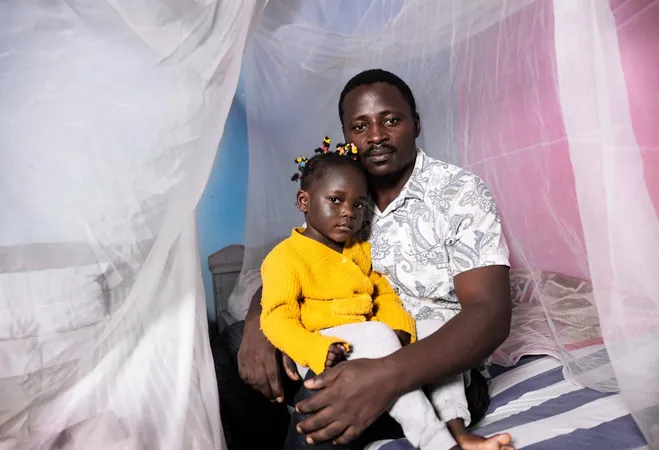
Global Fund Triumphs in 2023: Dramatic Reductions in HIV, TB, and Malaria Deaths!
2024-09-19
Global Fund Triumphs in 2023: Dramatic Reductions in HIV, TB, and Malaria Deaths!
The Global Fund has made significant strides in combating HIV, tuberculosis (TB), and malaria since its inception in 2002, achieving a remarkable 61% reduction in deaths related to these diseases and saving an estimated 65 million lives, as detailed in its latest annual report released on Thursday.
In a landmark year, the organization revealed fantastic news for treatment accessibility: a staggering 55% reduction in the price of bedaquiline, the cornerstone medication for drug-resistant TB, along with a 25% cut in the cost of TLD, the primary first-line HIV treatment. This progress is crucial not just for patients but for the overall public health landscape.
Additionally, the Global Fund has introduced innovative dual-active ingredient insecticide-treated mosquito nets that boast a 45% increase in effectiveness against malaria, making strides towards eradicating this deadly disease.
A Power of Procurement
These advancements highlight the strategy referred to as "marketing-shaping," where the Global Fund leverages its substantial purchasing power to motivate manufacturers to lower prices. This approach enhances accessibility to life-saving treatments in low-income countries, where rates of HIV, TB, and malaria remain alarmingly high.
In 2023 alone, the Global Fund invested a record-setting $1.8 billion—its largest yearly expenditure—to bolster health and community systems. Executive Director Peter Sands announced ambitious plans for the upcoming grant cycle (2024-2026), with projections to invest around $6 billion to support countries in improving health outcomes, focus on pandemic preparedness, and advance towards universal health coverage.
Life-Saving Impact on Health Systems
One key area of investment is in providing oxygen supplies to health facilities, benefiting approximately 22 million patients suffering from respiratory issues. The report underscores the effect these initiatives have had on alleviating pressure on health systems, with 25 million people currently supported by antiretroviral medications, saving approximately 1.66 billion hospital days and 1.36 billion outpatient visits—an astounding total savings of around $85 billion.
Sands emphasized that the reduction in health issues tied to these three diseases translates to improved overall health performance, leading to lower maternal and infant mortality rates and fewer deaths from other health crises.
Confronting Climate Change Challenges
The Global Fund allocates around 70% of its funding to the 50 most climate-vulnerable countries, which are increasingly grappling with the effects of climate change that compromise health services—from floods disrupting medical supply chains to rising temperatures threatening the storage conditions for critical medicines.
Sands highlighted the dual nature of the challenges posed by climate change: the gradual rise in temperatures is allowing malaria to spread to new regions, previously shielded by cooler nights. Furthermore, extreme weather events, such as floods and cyclones, have led to surges in malaria cases in countries like Malawi and Pakistan.
The situation is dire, especially with malaria instances rising in conflict-affected areas where there is heightened resistance to insecticides and treatments. In response, the Global Fund has adapted its grant structures and offered emergency funding to countries such as Zambia, Kenya, and Somalia to help them mitigate these challenges.
Addressing Human Rights Barriers
A critical area of concern highlighted in the report is the human rights barriers facing those afflicted by HIV. Stigma, discrimination, punitive laws, and violence, particularly gender-based violence, continue to impede access to HIV prevention, testing, treatment, and care.
Sands stated, "The fight against diseases is as much a fight for justice and equity as it is a biomedical fight.” The Global Fund is expanding the Breaking Down Barriers initiative, emphasizing inclusivity and equity in healthcare delivery to address these vital issues.
This model, which thrives on collaborative governance among civil society, governments, and private sector partners, has proven to be crucial in overcoming the challenges faced in the past year.
Conclusion: The Road Ahead
The Global Fund's endeavors in reducing the burden of HIV, TB, and malaria illustrate a powerful narrative of hope and resilience. As investments continue to flow and innovative solutions are rolled out, the world remains optimistic about the future of global health—with a vision where accessibility, equity, and comprehensive care is within everyone's reach. Stay tuned as the Global Fund embarks on this transformative journey to save even more lives!
 Brasil (PT)
Brasil (PT)
 Canada (EN)
Canada (EN)
 Chile (ES)
Chile (ES)
 España (ES)
España (ES)
 France (FR)
France (FR)
 Hong Kong (EN)
Hong Kong (EN)
 Italia (IT)
Italia (IT)
 日本 (JA)
日本 (JA)
 Magyarország (HU)
Magyarország (HU)
 Norge (NO)
Norge (NO)
 Polska (PL)
Polska (PL)
 Schweiz (DE)
Schweiz (DE)
 Singapore (EN)
Singapore (EN)
 Sverige (SV)
Sverige (SV)
 Suomi (FI)
Suomi (FI)
 Türkiye (TR)
Türkiye (TR)